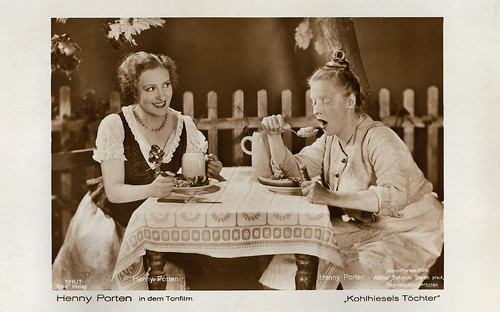
German postcard by Ross Verlag, no. 126/1. Photo: Atelier Schmoll, Berlin / Nero-Porten-Film. Henny Porten in Kohlhiesels Töchter/Kohlhiesel's Daughters (Hans Behrendt, 1930).

German postcard by Ross Verlag, no. 68/1. Photo: Atelier Balazs, Berlin / Henny Porten-Film. Henny Porten in the German silent drama Violantha (Carl Froehlich, 1927).

German postcard by Ross Verlag, no. 75/4. Photo: A. Schmoll, Berlin / Henny-Porten-Film. Henny Porten in Meine Tante - deine Tante (Carl Froehlich, 1927).

Yugoslavian postcard, based on a German postcard, Ross Verlag, no. 100/1. Photo: Atelier Schmoll, Berlin / Henny Porten Filmproduktion (HPF). Henny Porten and Franz Lederer in Zuflucht/Refuge (Carl Froelich, 1928). Released in former Yugoslavia as Utočište.

German postcard by Ross Verlag, no. 106/2. Photo: Henny Porten-Froehlich produktion (HPF). Henny Porten and Paul Henckels in Liebfraumilch/German Wine (Carl Froehlich, 1929).

German Postcard by Ross Verlag, no. 109/4. Photo: Henny Porten-Froelich Produktion (HPF). Publicity still for Die Frau, die jeder liebst, bist Du (Carl Froehlich, 1929).

German postcard by Ross Verlag, no. 122/3. Photo: Schmoll / Nero-Porten-Film. Henny Porten and Oskar Sima in the German early sound film Skandal um Eva/Scandalous Eva (Georg Wilhelm Pabst, 1930).
Trouble with Goebbels
Henny Porten seemed to pass from silent to sound cinema without any obstacles. She starred in such films as Mutterliebe/Mother Love (Georg Jacoby, 1929) with Gustav Diessl, Die Herrin und ihr Knecht/The Boss and Her Servant (Richard Oswald, 1929) with Mary Kid, and a remake of Kohlhiesels Töchter/Kohlhiesel's Daughters (Hans Behrendt, 1930) opposite Fritz Kampers.
The following year she achieved her long-planned project, the film Luise, Königin von Preußen/Luise, Queen of Prussia (Carl Froelich, 1931) with Gustaf Gründgens, which ultimately bankrupted her company in the summer of 1932. After this project, Porten was considered to be a risk within the film industry. With no film engagements coming, she sought refuge on stage.
She achieved renewed film success in the autumn of 1933, with the sound film remake of Mutter und Kind/Mother and Child (Hans Steinhoff, 1933). She had become the quintessence of German womanhood, ladylike yet kindhearted and a not a little petit bourgeois.
There were years Henny Porten had done twelve films a year, but the Nazi takeover of Germany in 1933 brought her career to an almost standstill. Her refusal to divorce her Jewish husband Wilhelm von Kaufmann got her in trouble with propaganda minister Josef Goebbels.
When she resolved to emigrate to join Ernst Lubitsch in Hollywood, he denied her an exit visa to prevent a negative impression. Goebbels tried to ban her from the film industry, but she made a few films after the Allied bombardment started, and her placid and reassuring persona helped calm audiences.
In 1937 she was taken on by the Tobis company on a work for money basis but was never offered any work. Porten was permitted to work in such Austrian-made films as the comedy Der Optimist/The Optimist (E.W. Emo, 1938) with Viktor de Kowa and Theo Lingen, and the crime drama War es der im Dritten Stock/Was It Him on the Third Floor? (Carl Boese, 1938).

German postcard by Ross Verlag, no. 92/2. Photo Alex Schmoll, Berlin / Henny Porten-Froehlich Produktion. Henny Porten in a double role in Liebe und Diebe (Carl Froehlich, 1928).
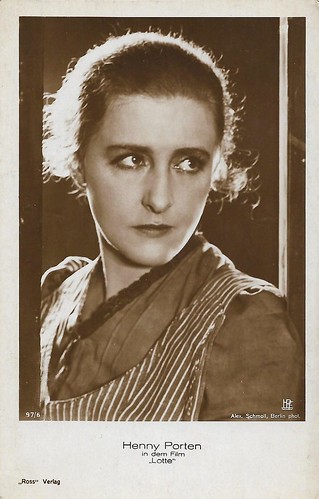
German postcard by Ross Verlag, no. 97/6. Photo: Alex Schmoll, Berlin / HPF (Henny Porten-Froehlich Produktion). Henny Porten in Lotte (Carl Froehlich, 1928).
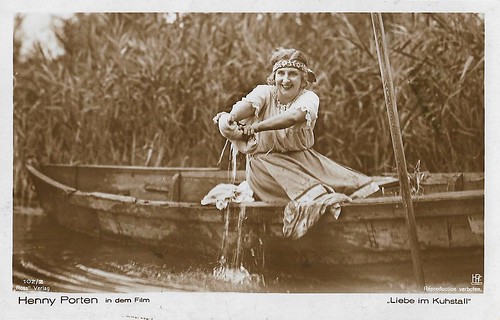
German postcard by Ross Verlag, no. 102/2. Photo: Henny Porten Freuhlich-Produktion. Henny Porten in Liebe im Kuhstall/Love in the Cowshed (Carl Froelich, 1928).
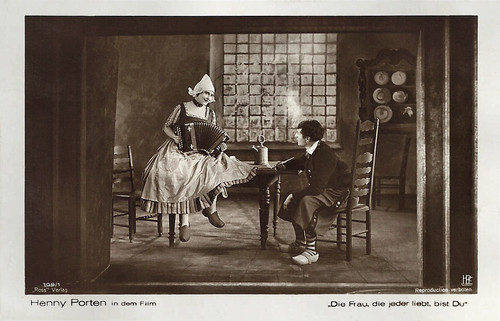
German Postcard by Ross Verlag, no. 109/1. Photo: Henny Porten Film. Publicity still for Die Frau, die jeder liebst, bist Du (Carl Froehlich, 1928-1929).
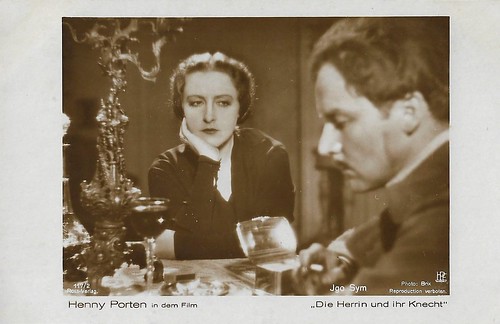
German postcard by Ross Verlag, no. 117/2. Photo: Brix /Henny Porten-Film Produktion. Henny Porten and Igo Sym in Die Herrin und ihr Knecht (Richard Oswald, 1929), a drama taking place at the German-Russian border shortly before and during the First World War.
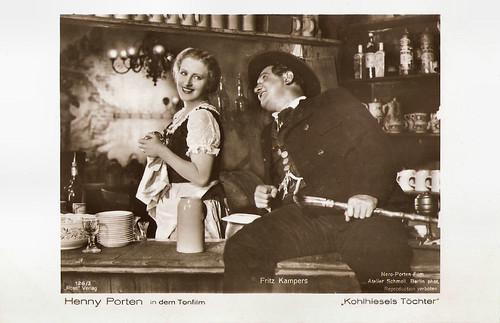
German postcard by Ross Verlag, no. 126/3. Photo: Atelier Schmoll, Berlin / Nero-Porten-Film. Publicity still for Kohlhiesels Töchter/Kohlhiesel's Daughters (Hans Behrendt, 1930) with Fritz Kampers.
Deserting to the DDR
Henny Porten was hired by old friend G.W. Pabst to play the duchess in Komödianten/The Comedians (Georg Wilhelm Pabst, 1941) with Käthe Dorsch and Hilde Krahl, and she was reunited with Carl Froelich for the homey comedy Familie Buchholz/The Buchholz Family (Carl Froelich, 1944).
In 1944, after an aerial mine destroyed their home, Porten and her husband were out on the streets, as it was forbidden to shelter a full Jew.
After the war, offers remained poor. Henny Porten lived in Ratzeburg and performed in Lübeck and the Hamburg Theater in 1947. She was given a small role in the comedy Absender unbekannt/Sender unknown (Ákos Ráthonyi, 1950).
So in 1953, she followed an invitation made by the DEFA studio to go east to the new DDR. There she played leading roles in Carola Lamberti - Eine vom Zirkus/Carola Lamberti - One From the Circus (Hans Müller, 1954) and the crime drama Das Fräulein von Scuderi/The Miss from Scuderi (Eugen York, 1955), which would prove to be her last film.
In the Western press, her step was branded as that of a 'deserter'. When Porten and her husband returned to Ratzeburg in 1955, they were evicted by their landlord. Von Kaufmann lost his practice. Through the press, Porten unsuccessfully asked for work in film.
They moved to Berlin in 1957, where Von Kaufmann died in 1959. In 1960, Henny Porten finally was awarded the Bundesverdienstkreuz, but she died after suffering a severe illness a few months later.
Between 1906 and 1955 Henny Porten appeared in over 170 films.

German postcard by Ross Verlag, no. 126/4. Photo: Atelier Schmoll, Berlin / Nero-Porten-Film. Henny Porten in Kohlhiesels Töchter/Kohlhiesel's Daughters (Hans Behrendt, 1930).

German postcard by Ross Verlag, Berlin, no. 134/2. Photo: Atelier Schmoll, Berlin / Henny Porten Filmproduktion (HPF). Henny Porten as Luise, Queen of Prussia and Gustav Gründgens as her husband, King Friedrich Wilhelm III, in the German early sound film Luise, Königin von Preußen/Luise, Queen of Prussia (Carl Froehlich, 1931).
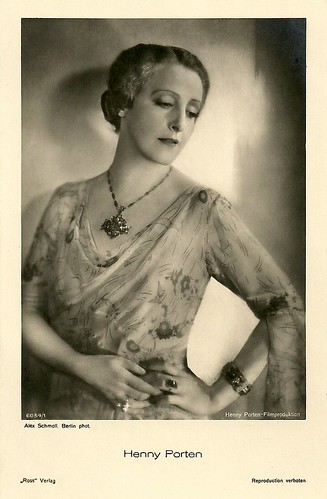
German postcard by Ross Verlag, no. 6059/4, 1931-1932. Photo Alex Schmidt, Berlin / Henny-Porten-Filmproduktion.
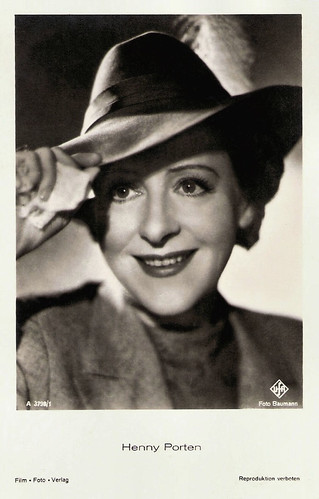
German postcard by Film-Foto-Verlag, no. A 3787/1, 1941-1944. Photo: Baumann / Ufa.
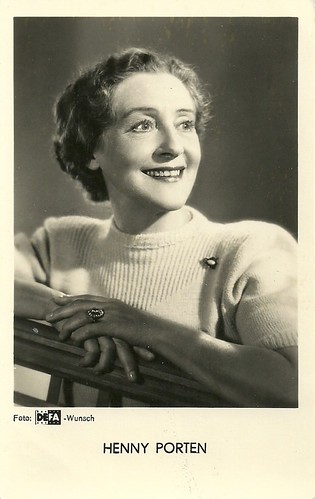
German postcard. Photo: DEFA / Wunsch.

East-German postcard by VEB Volkskunstverlag Reichenbach I.V., Berlin, no. G 634, 1956. Photo: Wenzel. Henny Portern in Carola Lamberti (Hans Müller, 1954).
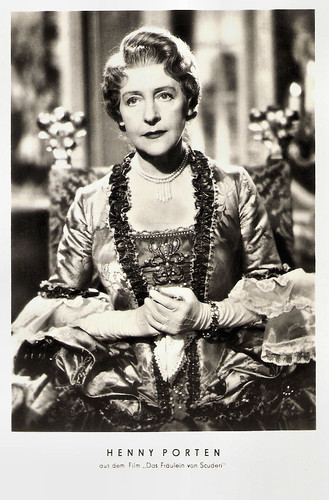
East-German postcard by VEB Volkskunstverlag Reichenbach I.V., Berlin, no. G 566, 1955. Photo: DEFA / Neufeld. Henny Portern in Das Fräulein von Scuderi (Eugen York, 1955).
Sources: Thomas Staedeli (Cyranos), Hans J. Wollstein (AllMovie), Denny Jackson (IMDb), Filmportal.de, Wikipedia and IMDb.
No comments:
Post a Comment